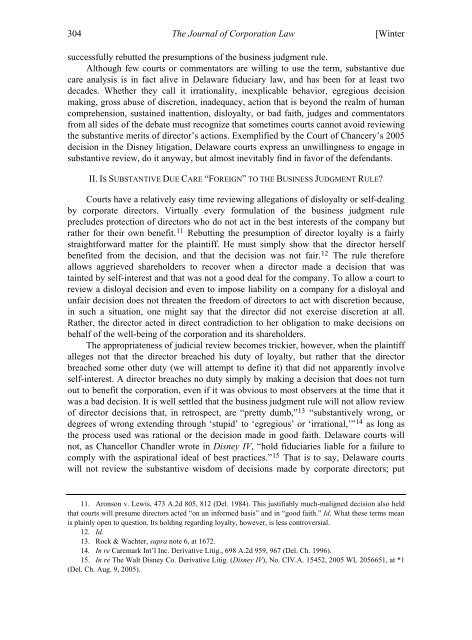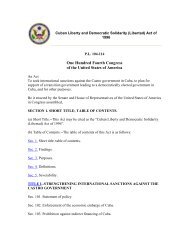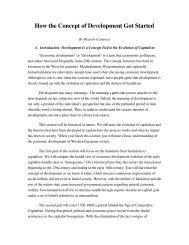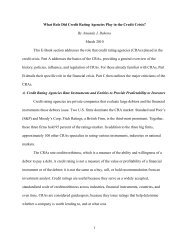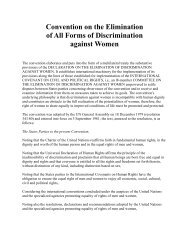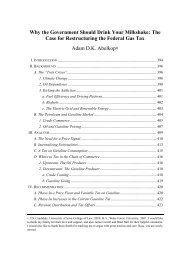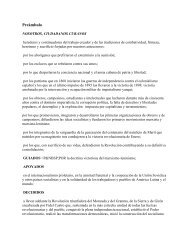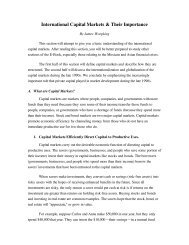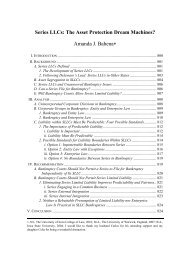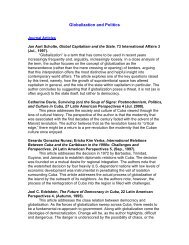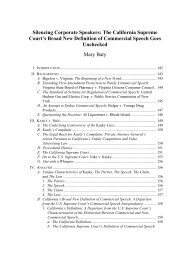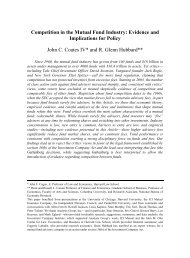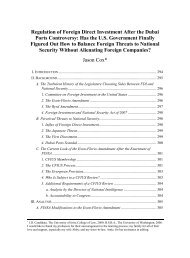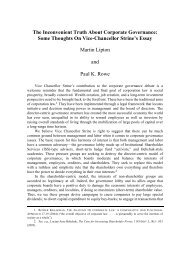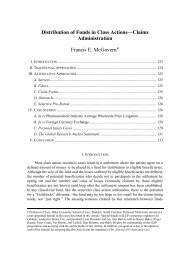Galactic Stupidity and the Business Judgment Rule - College of Law
Galactic Stupidity and the Business Judgment Rule - College of Law
Galactic Stupidity and the Business Judgment Rule - College of Law
Create successful ePaper yourself
Turn your PDF publications into a flip-book with our unique Google optimized e-Paper software.
304 The Journal <strong>of</strong> Corporation <strong>Law</strong> [Winter<br />
successfully rebutted <strong>the</strong> presumptions <strong>of</strong> <strong>the</strong> business judgment rule.<br />
Although few courts or commentators are willing to use <strong>the</strong> term, substantive due<br />
care analysis is in fact alive in Delaware fiduciary law, <strong>and</strong> has been for at least two<br />
decades. Whe<strong>the</strong>r <strong>the</strong>y call it irrationality, inexplicable behavior, egregious decision<br />
making, gross abuse <strong>of</strong> discretion, inadequacy, action that is beyond <strong>the</strong> realm <strong>of</strong> human<br />
comprehension, sustained inattention, disloyalty, or bad faith, judges <strong>and</strong> commentators<br />
from all sides <strong>of</strong> <strong>the</strong> debate must recognize that sometimes courts cannot avoid reviewing<br />
<strong>the</strong> substantive merits <strong>of</strong> director’s actions. Exemplified by <strong>the</strong> Court <strong>of</strong> Chancery’s 2005<br />
decision in <strong>the</strong> Disney litigation, Delaware courts express an unwillingness to engage in<br />
substantive review, do it anyway, but almost inevitably find in favor <strong>of</strong> <strong>the</strong> defendants.<br />
II. IS SUBSTANTIVE DUE CARE “FOREIGN” TO THE BUSINESS JUDGMENT RULE?<br />
Courts have a relatively easy time reviewing allegations <strong>of</strong> disloyalty or self-dealing<br />
by corporate directors. Virtually every formulation <strong>of</strong> <strong>the</strong> business judgment rule<br />
precludes protection <strong>of</strong> directors who do not act in <strong>the</strong> best interests <strong>of</strong> <strong>the</strong> company but<br />
ra<strong>the</strong>r for <strong>the</strong>ir own benefit. 11 Rebutting <strong>the</strong> presumption <strong>of</strong> director loyalty is a fairly<br />
straightforward matter for <strong>the</strong> plaintiff. He must simply show that <strong>the</strong> director herself<br />
benefited from <strong>the</strong> decision, <strong>and</strong> that <strong>the</strong> decision was not fair. 12 The rule <strong>the</strong>refore<br />
allows aggrieved shareholders to recover when a director made a decision that was<br />
tainted by self-interest <strong>and</strong> that was not a good deal for <strong>the</strong> company. To allow a court to<br />
review a disloyal decision <strong>and</strong> even to impose liability on a company for a disloyal <strong>and</strong><br />
unfair decision does not threaten <strong>the</strong> freedom <strong>of</strong> directors to act with discretion because,<br />
in such a situation, one might say that <strong>the</strong> director did not exercise discretion at all.<br />
Ra<strong>the</strong>r, <strong>the</strong> director acted in direct contradiction to her obligation to make decisions on<br />
behalf <strong>of</strong> <strong>the</strong> well-being <strong>of</strong> <strong>the</strong> corporation <strong>and</strong> its shareholders.<br />
The appropriateness <strong>of</strong> judicial review becomes trickier, however, when <strong>the</strong> plaintiff<br />
alleges not that <strong>the</strong> director breached his duty <strong>of</strong> loyalty, but ra<strong>the</strong>r that <strong>the</strong> director<br />
breached some o<strong>the</strong>r duty (we will attempt to define it) that did not apparently involve<br />
self-interest. A director breaches no duty simply by making a decision that does not turn<br />
out to benefit <strong>the</strong> corporation, even if it was obvious to most observers at <strong>the</strong> time that it<br />
was a bad decision. It is well settled that <strong>the</strong> business judgment rule will not allow review<br />
<strong>of</strong> director decisions that, in retrospect, are “pretty dumb,” 13 “substantively wrong, or<br />
degrees <strong>of</strong> wrong extending through ‘stupid’ to ‘egregious’ or ‘irrational,’” 14 as long as<br />
<strong>the</strong> process used was rational or <strong>the</strong> decision made in good faith. Delaware courts will<br />
not, as Chancellor Ch<strong>and</strong>ler wrote in Disney IV, “hold fiduciaries liable for a failure to<br />
comply with <strong>the</strong> aspirational ideal <strong>of</strong> best practices.” 15 That is to say, Delaware courts<br />
will not review <strong>the</strong> substantive wisdom <strong>of</strong> decisions made by corporate directors; put<br />
11. Aronson v. Lewis, 473 A.2d 805, 812 (Del. 1984). This justifiably much-maligned decision also held<br />
that courts will presume directors acted “on an informed basis” <strong>and</strong> in “good faith.” Id. What <strong>the</strong>se terms mean<br />
is plainly open to question. Its holding regarding loyalty, however, is less controversial.<br />
12. Id.<br />
13. Rock & Wachter, supra note 6, at 1672.<br />
14. In re Caremark Int’l Inc. Derivative Litig., 698 A.2d 959, 967 (Del. Ch. 1996).<br />
15. In re The Walt Disney Co. Derivative Litig. (Disney IV), No. CIV.A. 15452, 2005 WL 2056651, at *1<br />
(Del. Ch. Aug. 9, 2005).


